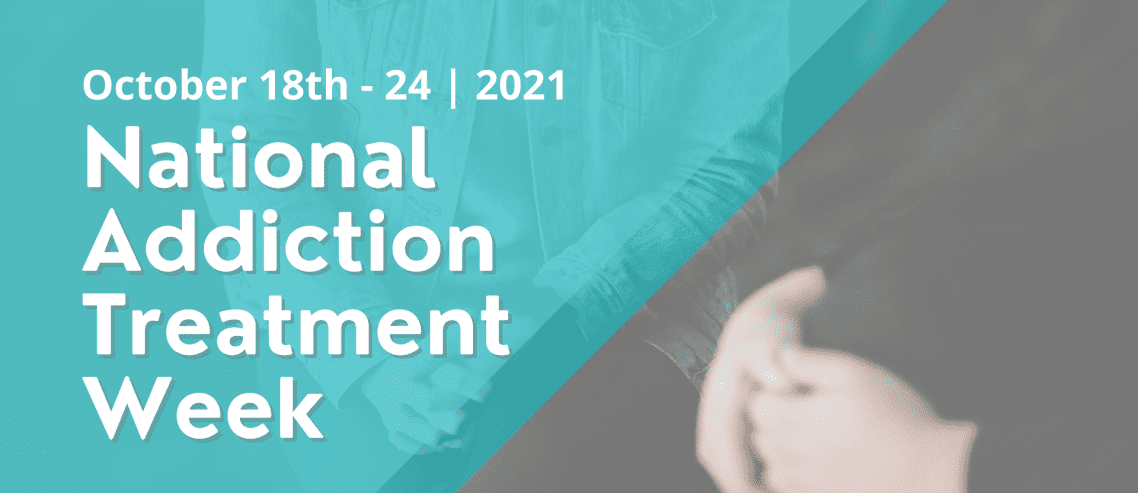Addiction Treatment Week: Join the Effort to Spread Awareness About Substance Misuse Treatment
2021’s Addiction Treatment Week is set for October 18th through the 24th. National Addiction Treatment Week is an initiative that seeks to promote substance use disorder as a very real disease – while spreading awareness of the available evidence-based treatments. With an ultimate goal of reminding anyone who is struggling that recovery is possible, this week also aims to highlight the need for clinicians to enter the field of addiction medicine, as the severity of substance misuse is on the rise in today’s landscape.
Below, we’ll go over what exactly substance use disorder is, and how we can all help spread awareness of treatment and recovery for those who are struggling to maintain sobriety.
What is Substance Use Disorder?
Substance use disorder is a condition in which an individual partakes in the uncontrolled use of a substance despite harmful consequences. Individuals struggling with substance misuse often have an intense dependency on certain substances such as alcohol, tobacco, and other drugs, to the point where their ability to function on a daily basis becomes impaired. These individuals also often continue to misuse these substances even with the awareness that they are causing negative consequences. The most severe SUDs are sometimes called addictions.
There are many symptoms of substance use disorder, but some of the most common include:
- Feeling the need to use the substance regularly, either daily or several times a day
- Intense urges for the drug that block out regular thoughts
- Developing a tolerance to the substance causing the need to take or use more
- Ensuring a steady supply of the substance
- Continued use of the drug even after acknowledging its negative physical or physiological effects
- Engaging in dangerous activities to either retrieve the substance, or while using the substance, including stealing, driving, and other violent acts
- Failing in attempts to stop using the substance
- Experiencing withdrawal symptoms when attempting to stop using the substance
While these symptoms primarily affect the individual suffering from substance misuse, many signs can often become apparent to others, like family or loved ones. This can include signs such as:
- Physical health issues – lack of energy, motivation, and signs of weight loss or gain
- Neglected appearance – failure to maintain proper hygiene, grooming, or clothing
- Changes in behavior – recurring secrecy with their belongings or space, or where they are going, and drastic shifts in behavior and interactions with family and friends
- Financial issues – mysterious requests for money without a reasonable explanation, or indication that personal money has been stolen or disappeared
Closing the Addiction Treatment Gap: Helping to Raise Awareness and Stop the Stigma
Substance use disorder is extremely common throughout the United States, affecting over 19.7 million adults over the age of twelve in 2017, alone. Nearly 74% of adults with an SUD struggled with an alcohol use disorder, and about 38% struggled with illicit drug misuse. 1 out of 8 adults struggled with both of these types of disorders simultaneously. It was also found in 2017 that about 8.5 million Americans suffered from both a mental health disorder, as well as a substance use disorder.
These statistics reveal a sobering reality that many individuals who suffer from substance misuse, and co-occurring mental health disorders, aren’t always getting the help they need. Reducing these statistics is enough reason for all of us to feel the need to take part in spreading awareness for substance misuse, and helping provide the means to find the treatment needed to help with these disorders.
People can help by sharing their own experiences, and relaying important substance use disorder treatment plan examples that may have worked for them in the past. Individuals can also help by donating to charities and joining in community efforts to establish an open communication about substance misuse. That way, we can break the stigma associated with mental health conditions and substance disorders, and provide ways for individuals to get the help and treatment they need.
Retreat Behavioral Health
Retreat Behavioral Health is committed to helping any individual find the highest quality treatment for substance use disorders. With a strong emphasis on holistic substance use treatment, we consider the individual needs of each patient and tailor rehabilitation programs accordingly. We utilize relapse prevention, as well as medication assisted treatment to help with the treatment of these disorders, by providing compassion, respect and acceptance to any individual, family, or community we serve. Contact us today to learn about our services, or to schedule an appointment.




